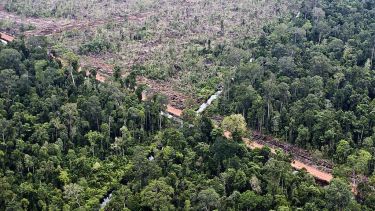More than 80 per cent of the Indonesian rainforest, mangroves and peatlands most vulnerable to being cleared for palm oil production is completely unprotected by the countryŌĆÖs Forest Moratorium, according to new research.
In a study published in the journal , a team of experts at the University of ║∙┬½ė░ęĄŌĆÖs Institute for Sustainable Food, Grantham Centre for Sustainable Futures and the National University of Singapore developed a model to explain and predict the expansion of oil palm plantations.
By considering the potential profitability of converting natural habitats into plantations, the researchers were able to predict oil palm expansion with 85 per cent accuracy and determine the importance of economic forces as a driving factor. They also found a ŌĆścontagionŌĆÖ effect, whereby areas with existing plantations experience greater crop expansion, potentially facilitated by an existing workforce and infrastructure.
The UK government this week proposed a ban on larger businesses using products grown on land that was deforested illegally ŌĆō but this research highlights the limitations of a key conservation law in Indonesia, the worldŌĆÖs largest producer and exporter of palm oil.
Indonesia saw a huge increase in oil palm plantations from two mega hectares (Mha) in 2000 to 8.6Mha in 2015, with the loss of 6Mha of forest. In 2010, the country passed legislation protecting over 69Mha of forest and peatlands from conversion under a Forest Moratorium, while allowing oil palm expansion in forests already licensed or degraded by logging.
║∙┬½ė░ęĄ and National University of Singapore researchers found that just 10 per cent of the areas identified as vulnerable to oil palm expansion by 2025 are currently protected by Indonesia's Forest Moratorium, while 83 per cent of vulnerable natural areas are left unprotected by the law.
ŌĆ£As global palm oil demands continue to rise, our model allows us to predict future crop expansion and identify areas most at risk from deforestation.
ŌĆ£IndonesiaŌĆÖs Forest Moratorium was introduced to protect precious habitats ŌĆō but its failure to cover most areas vulnerable to oil palm expansion means it actually risks exacerbating the climate and biodiversity crises.
ŌĆ£ItŌĆÖs good to see the UK government trying to end the use of products grown on illegally deforested land, but without adequate protection forests remain vulnerable to excessive crop expansion and habitat destruction.ŌĆØ
Dr Jolian McHardy
Senior Lecturer in Economics at the University of ║∙┬½ė░ęĄ and co-author of the paper
Contact
Sophie Armour, Media & PR Officer at the University of ║∙┬½ė░ęĄ: 07751 400 287 / 0114 222 3687 / sophie.armour@sheffield.ac.uk
The Institute for Sustainable Food and are research partners at the University of ║∙┬½ė░ęĄ, working together to tackle environmental challenges and build a fairer future.
The Institute for Sustainable Food brings together multidisciplinary expertise and world-class research facilities to help achieve food security and protect the natural resources we all depend on.
The Grantham Centre works with experts from academia, business and policy to create a sustainable future through pioneering research and training to help the world meet UN Sustainable Development Goals on everything from clean water to responsible consumption.

